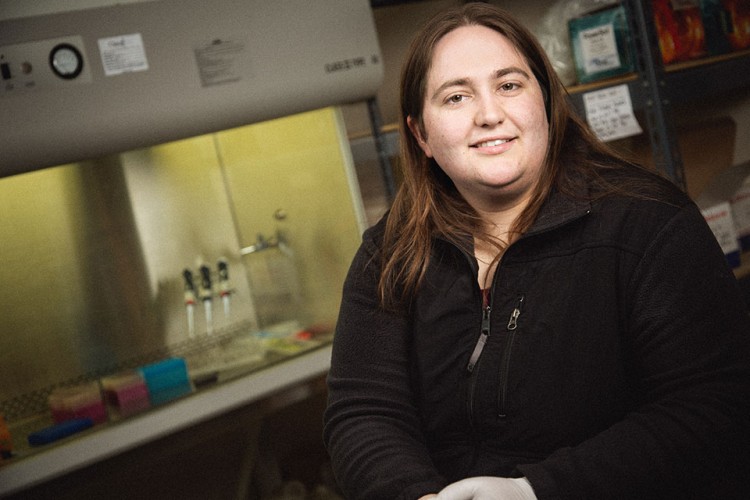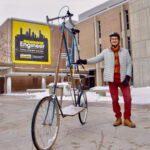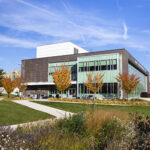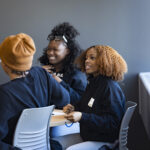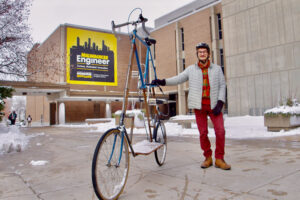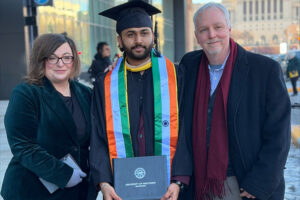- Ciara Rahn
- Degree: MS Freshwater Sciences, School of Freshwater Sciences
- Hometown: Delafield, Wis.
- It’s a fact: She boasts a fine collection of rubber ducks!
When Ciara Rahn chose a bachelor’s degree in geology, she did so because the physical science appealed to her – as did the fact that she would spend a lot of time outdoors.
But at the end of her four years at UW-Madison, her bachelor’s degree and a certificate in environmental science in hand, she took a little time off to explore which path to follow next.
“I knew I would need a master’s degree, but I didn’t want to continue in geology,” she says.
To help, she “bulked up” on a few undergraduate non-geology science classes, first at UW-Waukesha and then at UWM. Both experiences pointed her in the same direction: At UW-Waukesha, biology lecturer and UWM alum Michael Pauers encouraged Rahn to look into the School of Freshwater Sciences. Sandra McLellan, a UWM professor of freshwater sciences, suggested the same thing.
“I wanted a hands-on experience that would serve me well going forward into a science career, and the fact that I could finish this degree in two years was very appealing,” says Rahn.
She chose the option of earning a professional master’s degree, one that does not require a thesis for graduation. The option is designed for those who are not planning to pursue a Ph.D.
Choosing carefully has paid off. The City of Racine Health Department hired Rahn to monitor contaminants in its local waterways, a skill she learned while completing an internship there.
Heading outside
At SFS, Rahn got the outdoor projects she craved, although she admits she initially had to get her “sea legs.” She counts a day out on Lake Michigan aboard the research vessel Neeskay as an academic highlight.
Each member of the class was assigned sampling and collecting data on a different aspect of lake ecology. Rahn’s task was retrieval of zebra and quagga mussels, an invasive species, from the lake bottom.
“I wish the waves had been a little calmer. But it was a lot of fun,” she says.
Sampling environmental health indicators, like the effects of invasives, would ultimately help Rahn land an important component of the master’s program – an internship.
Julie Kinzelman, a research scientist for the Racine health department and UWM alumna, hired Rahn for an internship opportunity that involved water sampling and data collection along the Pike River.
“I tested for levels of the bacteria E. coli at 29 sites along the river,” she says of the six-month experience. “The Pike is an impaired river with runoff pollution that is typical of urban rivers.”
The work is essential because baseline data has never been collected before. The aim, for now, is to gather the information that will help biologists understand what is going on in the lake’s ecosystem before they begin the process of remediation.
The role of the public
Rahn discovered she enjoyed the part of the job that called for working with the public.
“I like the aspect of interacting with the public, to work with individuals and groups to find out what’s wrong with the waterways and then try to fix it.”
In fact, she remembers being pleasantly surprised at the level of citizen interest in clean rivers. “So many people would show up at the public meetings that they’d have to bring out more chairs,” she says. “They were just ordinary citizens and if they didn’t understand something, they weren’t afraid to ask.”
Post graduation, Rahn’s job entails gauging what’s in the water at a different location – the Wind Point watershed that lies between South Milwaukee and Racine.
Sounds perfect for the young woman who wanted to be outdoors.
“The monitoring goes on in all kinds of weather,” she says. “A lot of the collection points are off the beaten path. So it’s kind of an adventure.”
